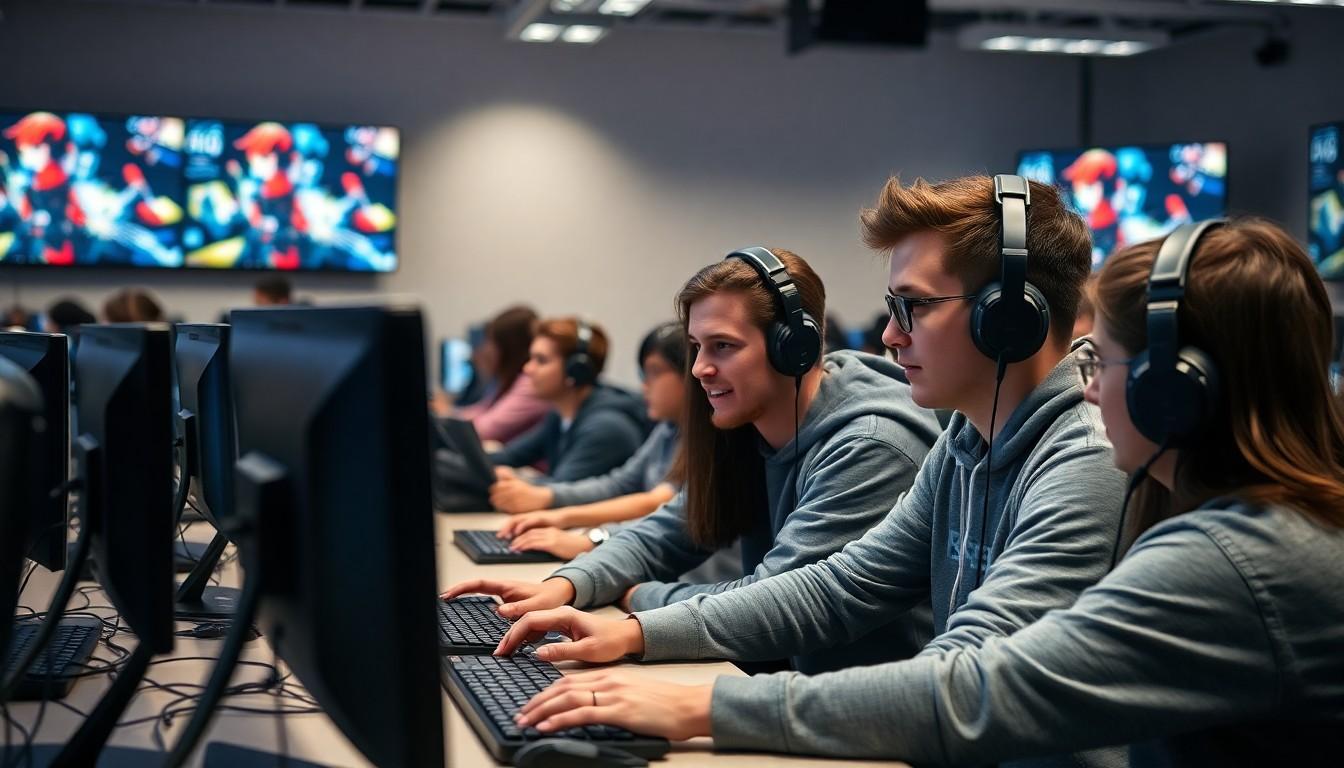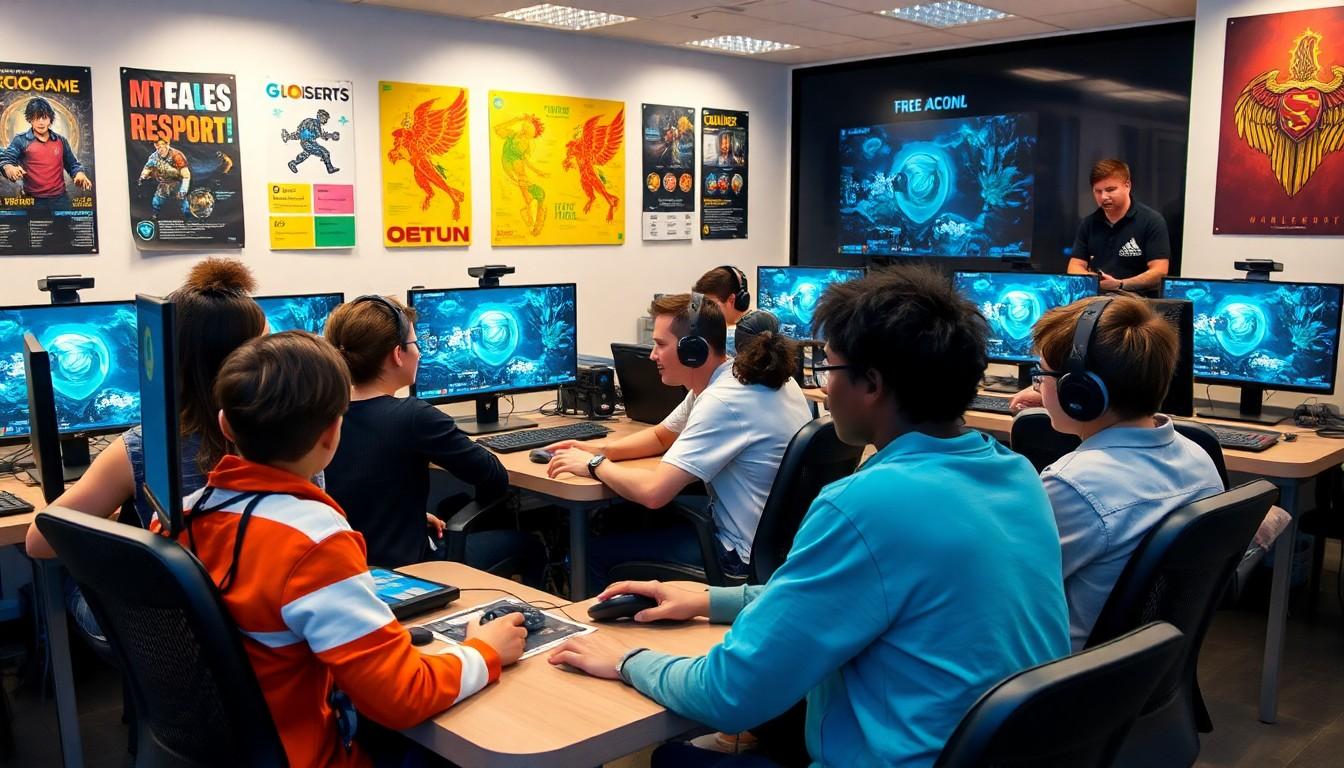Phone:
(701)814-6992
Physical address:
6296 Donnelly Plaza
Ratkeville, Bahamas.

In a world where gaming is no longer just a pastime but a booming industry, esports education is stepping into the spotlight. Imagine a classroom where students trade textbooks for game controllers and strategy guides. It’s not just about leveling up in a virtual arena; it’s about preparing for real-world careers in a rapidly evolving field.
Esports education integrates gaming into learning, focusing on skill development for career opportunities. This approach enhances traditional education by marrying academic principles with the dynamic nature of esports.
Esports education refers to academic programs that teach skills related to competitive gaming and the esports industry. These programs cover topics like game design, event management, and marketing. Recognizing its importance helps prepare individuals for careers in a rapidly expanding sector. Skills gained through these programs can include teamwork, strategic thinking, and communication. Employers value these skills, making graduates more attractive in the job market. With the industry projected to reach $1.8 billion by 2022, the role of esports education has become crucial in shaping future professionals.
Growth in esports education shows remarkable trends across various educational institutions. Universities and colleges have established dedicated programs, enrolling thousands of students. Interest in esports-related degrees has surged, reflecting the industry’s popularity. For instance, the number of esports programs in the U.S. jumped from 25 in 2016 to over 170 in 2022. Additionally, high schools worldwide recognize the importance of esports, offering clubs and courses. This expansion demonstrates a shift in perception, viewing gaming as a viable career path and an engaging educational tool.

Curriculum development in esports education focuses on creating robust programs tailored to industry demands. Key areas include essential skills and knowledge necessary for success.
Students acquire critical skills such as teamwork, strategic thinking, and communication. Problem-solving abilities also come into play, equipping them to navigate the complexities of the esports industry. In addition, knowledge of game design, event management, and marketing gives graduates a competitive edge. Mastering these skills enhances employability in a rapidly growing job market. Employers increasingly seek applicants with a combination of gaming knowledge and traditional academic skills.
Programs typically consist of theoretical coursework and hands-on learning experiences. Incorporating internship opportunities allows students to gain real-world experience in esports environments. Course offerings often include modules on game development, production techniques, and business strategies. Specific assessments evaluate students’ understanding and application of relevant concepts. Designed to be flexible, the structure accommodates various learning styles and career goals, ensuring that graduates meet industry needs effectively.
Esports education offers significant advantages for students, blending academic rigor with practical skills for the digital landscape.
Classes in esports education promote critical thinking and strategic planning. Students engage with subjects like mathematics and technology in context, enhancing their understanding. Exposure to teamwork fosters collaboration, encouraging peer communication and problem-solving. Learning in this environment often boosts motivation, making education more enjoyable. Active participation in game-related projects reinforces theoretical concepts, ensuring a comprehensive learning experience. Enhanced creativity emerges as students design games and work on innovative projects relevant to the industry.
Esports education opens various pathways in the gaming and entertainment sectors. Students develop skills that employers highly value, such as project management and digital marketing. Graduates can pursue roles in game design, event management, and marketing strategies, navigating a diverse job market. Networking opportunities arise through internships, connecting students with industry professionals. As the esports industry continues to grow, new positions emerge, creating a landscape ripe for career exploration. Graduates benefit from a competitive edge, positioning themselves favorably in a rapidly expanding field.
Esports education faces several challenges that can inhibit its growth and effectiveness.
Misconceptions often overshadow the benefits of esports education. Many people view gaming as unproductive. Others associate it with a lack of discipline. Such stereotypes detract from the educational value esports programs offer. Educators continually emphasize the transferable skills gained through esports, including teamwork and communication. Addressing these misconceptions lays the groundwork for broader acceptance.
Resource allocation poses significant hurdles for esports education. Many institutions struggle to secure sufficient funds for infrastructure and equipment. Equipment costs, such as gaming computers and peripherals, impact program development. Additionally, funding limitations affect curriculum expansion and faculty hiring. Institutions often seek sponsorships and partnerships with esports organizations to alleviate financial strain. Collaboration with industry players fosters a more robust educational environment, enhancing program viability.
Esports education is gaining traction with various institutions establishing successful programs across the globe. These programs showcase innovative strategies that prepare students for the evolving esports landscape.
Several universities lead in integrating esports into their curricula. The University of California, Irvine offers a dedicated esports program focusing on game design and management. Additionally, Harrisburg University in Pennsylvania has developed a robust curriculum centered on gaming and analytics. An impressive enrollment indicates strong interest in these programs, with thousands of students pursuing degrees in an area often overlooked. The establishment of scholarships further incentivizes student involvement, highlighting the commitment of these institutions to nurturing esports talent.
Unique teaching methodologies characterize successful esports education programs. Blending theoretical knowledge with hands-on experience allows students to develop crucial skills. Project-based learning often facilitates real-world applications, engaging students in activities that mirror industry practices. Integration of online platforms promotes collaboration, enabling remote teamwork and communication. Moreover, partnerships with industry professionals enhance learning, providing students exposure to current trends and career opportunities. Techniques such as gamification increase engagement and motivation, making learning both enjoyable and effective. These innovative strategies set the foundation for effective education tailored to the needs of the esports industry.
Esports education represents a transformative force in the gaming industry. It not only prepares students for careers in a booming sector but also fosters essential skills that are increasingly valued by employers. As academic institutions continue to innovate and expand their offerings, the integration of esports into educational frameworks becomes more pronounced.
By embracing this dynamic field, students gain practical experience and theoretical knowledge that align with industry demands. The future of esports education looks promising as it breaks down stereotypes and opens doors to diverse career opportunities. With ongoing support and investment, esports education can thrive, shaping the next generation of gaming professionals.